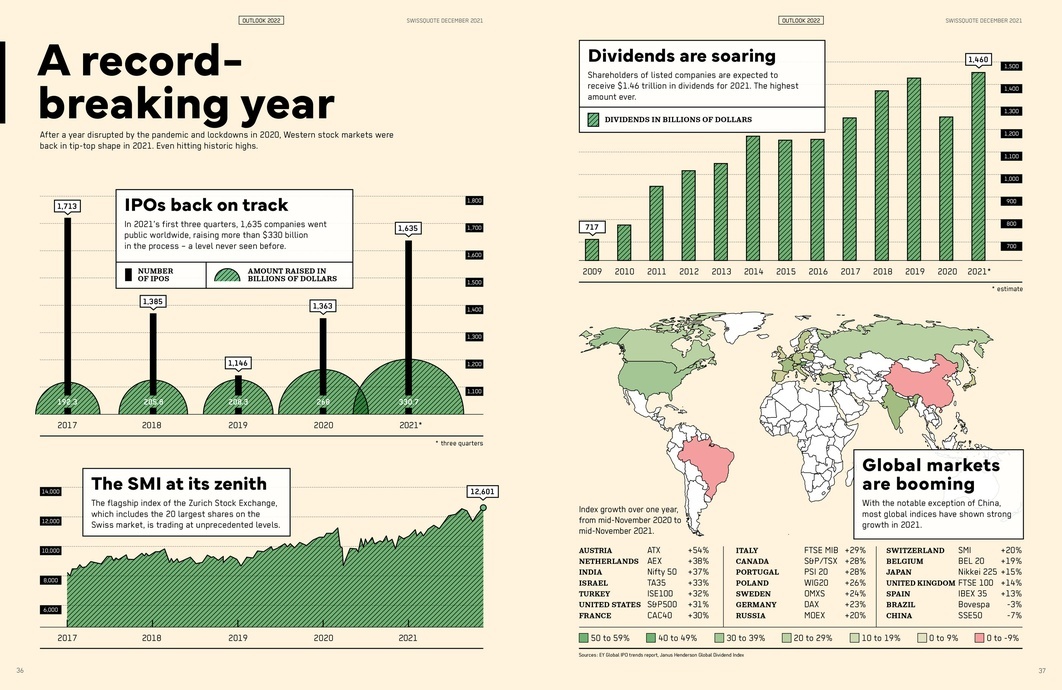
Outlook 2022
Excitement is building
Financial markets have been hitting one record after another over the past few months. Will the stock market marathon continue in 2022? Analysts are more divided than ever. We take a closer look.
By Bertrand Beauté
Barring a catastrophe in December, 2021 will go down in history as an exceptional year for stock markets. For instance, since 1 January the Swiss Market Index (SMI) has risen by more than 15% (as of 26 November). Its US counterpart, the S&P 500, and the CAC 40, the main index of the Paris stock exchange, climbed by almost 25%. With this in-your-face performance, Western markets have not only wiped out the declines of 2020, a particularly rocky year due to the pandemic, but also topped their own records. On 16 November, the SMI reached an all-time high of more than 12,573 points.
So what happens next? Can this bullish trend continue? Eleanor Taylor Jolidon, co-head of Swiss and Global Equity at Union Bancaire Privée (UBP), believes it can. "I am optimistic for 2022," the expert says. "The economy has stayed on track in recent months with a good recovery, registering strong growth since July. This growth is expected to last into 2022, which could have a positive impact on markets." Goldman Sachs shares this view.
In a note released in November, the US bank pointed to another strong year, predicting a 9% rise in the S&P 500 index from the current 4,700 to 5,100 points. "The equity bull market will continue," as David Kostin, chief US equity strategist at Goldman Sachs, summed up in an interview with Yahoo! Finance.
However, Morgan Stanley takes a completely different stance in a note published in November. The US bank forecasts a 6% decline in the S&P 500 from the current level to 4,400 points in 2022. Where does such a difference in interpretation come from? Optimists believe that the global economy will continue its newfound growth and push share prices upwards.
"With the support of central banks, government investment plans, fiscal stimulus and business confidence, the economy is headed for a bright future," Eleanor Taylor Jolidon says. "After coming to a screeching (forced) halt caused by the pandemic, the economy has recovered nicely in 2021. This growth will continue in 2022, although at a slower pace than in 2021. And it is more sustainable, because companies are required to invest massively to comply with new environmental requirements. The current growth period will therefore last longer than in normal economic cycles."
The International Monetary Fund (IMF) forecasts global growth of 4.9% for 2022, compared with 5.9% in 2021. "Companies have reached a consensus that this will translate into earnings growth of around 9% in developed markets and 12% for Swiss companies," says Eleanor Taylor Jolidon. "Personally, I think that global and Swiss companies’ profits could grow by as much as 15%."
"The equity bull market will continue"
David Kostin, chief US equity strategist at Goldman Sachs
However, a few clouds began casting a shadow over these rosy forecasts in the autumn, fuelling pessimists’ mistrust. "If growth continues as expected, the equity market is not that expensive and could still deliver returns of 8% to 10% in 2022," says Hubert Lemoine, chief investment officer at Schelcher Prince Gestion. "But warnings abound that these growth predictions may not come through. This makes the markets uncertain."
Nicolas Simar agrees, "I am more cautious than I was a year ago about the upside potential of equity markets" says the senior portfolio manager of Euro and European High Dividend strategies for NN Investment Partners. "At the beginning of 2021, the economy was coming out of the crisis, which brought opportunities. Now, the market is extremely expensive and factors are falling into place that will lead to a correction."
Soaring energy prices
First, the surge in energy and commodity prices has suddenly driven up inflation. Then in October, consumer prices rose 5.4% in the United States, 3.1% in the United Kingdom and 4.1% in the eurozone. "This inflationary pressure will continue into 2022," Simar warns. "Only companies that can raise their product prices will be able to maintain their margins." Hubert Lemoine thinks so too. "Inflation is currently a risk. It could hamper growth and consumption.
Central banks in developed countries have taken this threat seriously by gradually implementing piecemeal measures that will rein in their monetary policy. All possible precautions are being taken in the process to avoid panicking the markets or weakening the economy, which has been propped up by monetary policy since 2020. "Central banks will probably their aid, but will do so gently, very gradually," says Eleanor Taylor Jolidon from UBP. "And then the European and US stimulus packages will continue to sustain the economy in 2022."
After Norway, New Zealand, Australia, Canada and Poland, the US Federal Reserve (Fed) began to taper its asset purchases in November. From the current $120 billion per month, purchases will be scaled back by $15 billion each month, until they are reduced to zero. At this rate, the Fed will cease all asset purchases in mid-June 2022. But it says it is prepared to adjust this policy "if warranted by changes in the economic outlook". In other words, if inflation remains too high, the reduction in the pace of asset purchases will be accelerated.
"So far, the markets have trusted the narrative from central banks that inflation is a transitory phenomenon associated with temporary factors such as rising energy prices, the reopening of the economy and shortages of certain components such as semi- conductors," explains Nicolas Simar of NN Investment Partners. "But the normalisation of monetary policy in 2022 could cause the markets to reverse direction. Investors should beware of when the monetary tap is turned off."
"I am more cautious than I was a year ago"
Nicolas Simar, senior portfolio manager of Euro and European High Dividend strategies for NN Investment Partners
The European Central Bank (ECB) has therefore decided to take its time. "When inflation pressure is expected to fade – as is the case today – it does not make sense to react by tightening policy," ECB President Christine Lagarde said in mid-November. This stance suggests that monetary policy, including asset purchases, continues to support the economy. "Europe remains a good market," Simar says. "I think it is less vulnerable than the United States, with attractive growth and a more accommodative monetary policy."
Another red flag is slowing Chinese growth against a backdrop of power shortages, a property crisis, the mismanagement of Evergrande, a property giant on the verge of bankruptcy. "The Chinese central bank has been lowering its growth outlook for 2022 for the past two months," says Hubert Lemoine." In 2015, Chinese markets slowed ahead of Western markets. Some economists therefore fear that the Chinese slump will jeopardise global growth and spread to other markets." Furthermore, the resurgence of the virus in Europe in the early autumn shows that things are not yet completely under control with regards to the pandemic. No one knows how the markets would react to another large-scale lockdown.
Flight towards technology stocks
In this uncertain context, which stocks should investors choose? Here again, analysts can’t come to a consensus. As Daniel Ives, an analyst at Wedbush Securities, put it "For 2022 expect another robust year for tech stocks; new year but same playbook." In other words, the big winners will still be the US tech giants like Facebook (Meta), Amazon, Apple, Netflix, Alphabet (Google), Microsoft and the like.
But some analysts are put off by the exorbitant values of their shares. "People buy shares that perform best, which increases their capitalisation and their appeal to the point of excess," says Simar. "These days, everyone is investing in US tech stocks. Shares are trading at record levels, with a very high price-to-earnings ratio. The question is not whether this trend will turn around, but when." The finance expert advises moving away from the tech sector towards industries that can pass the higher prices of materials on to consumers, such as luxury goods and European oil companies, which are taking advantage of higher oil prices in the short term to invest in renewable energy.
To hedge against risks, Eleanor Taylor Jolidon recommends focusing on strong growth companies. "Strong growth companies, which create value (calculated by a liquid return on investment greater than their cost of capital), tend to outperform the market over the long term. Quality pays off." And in that respect, Swiss companies are doing very well. "Along with US companies, Swiss companies create the most value in the world," Eleanor Taylor Jolidon says. "As a result, Swiss market corrections are often more modest than with less value-enhancing markets, while appreciating when markets rise." The SMI’s increase of only 15% in 2021 (as of 26 November), while the CAC 40 has gained 25% is also because the Swiss stock market index held up better in the pandemic. Meanwhile, in 2020 the SMI posted a slight increase (0.05%), while the CAC 40 closed the year down 7%.

